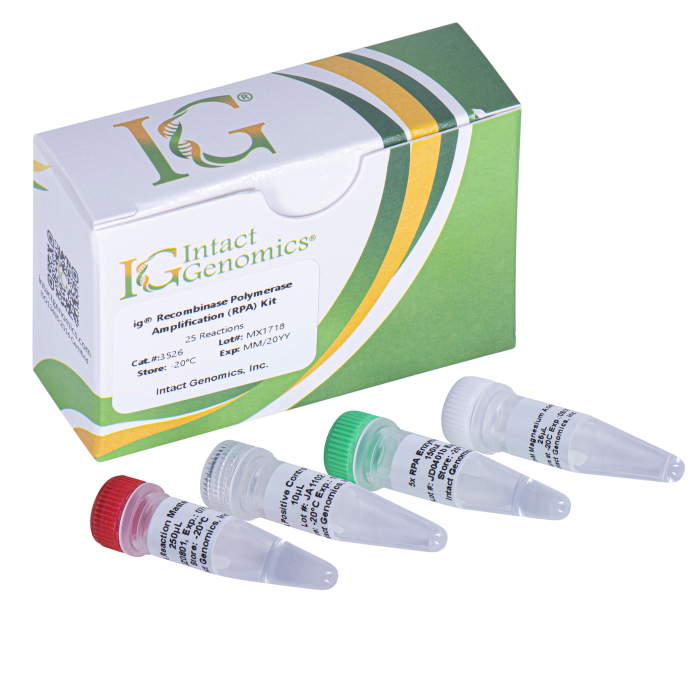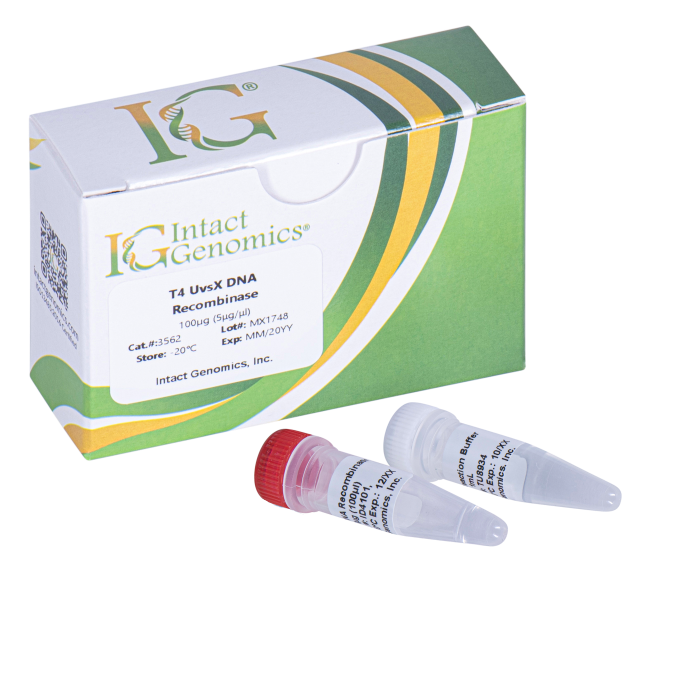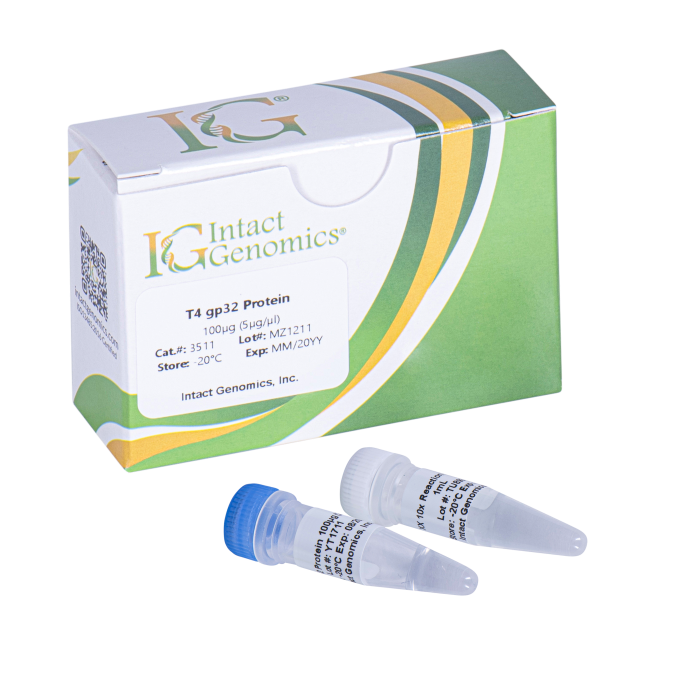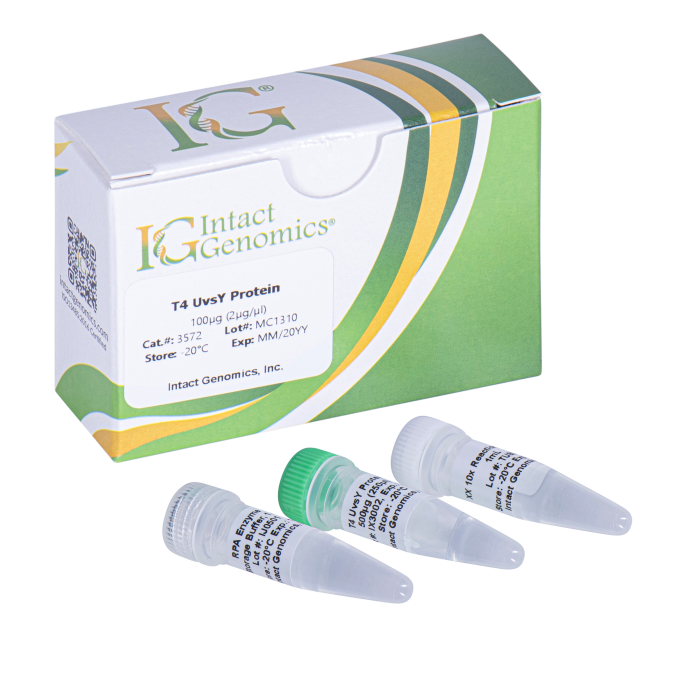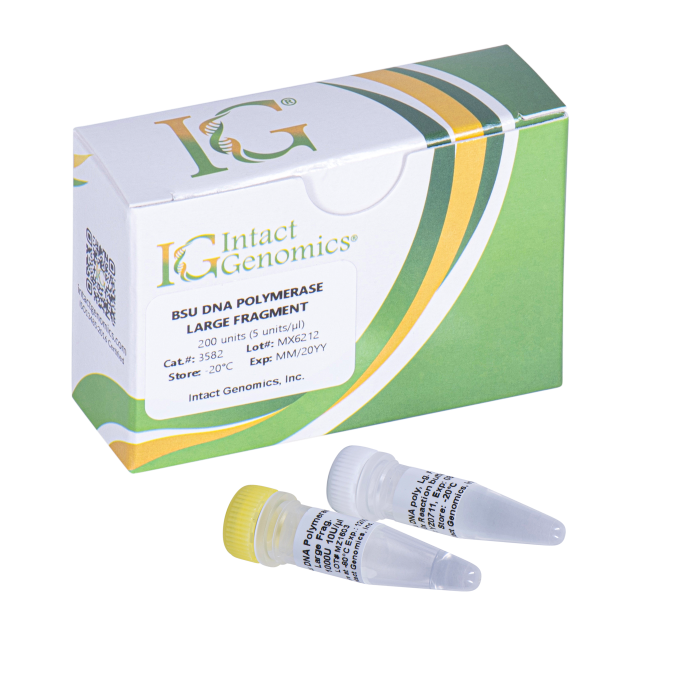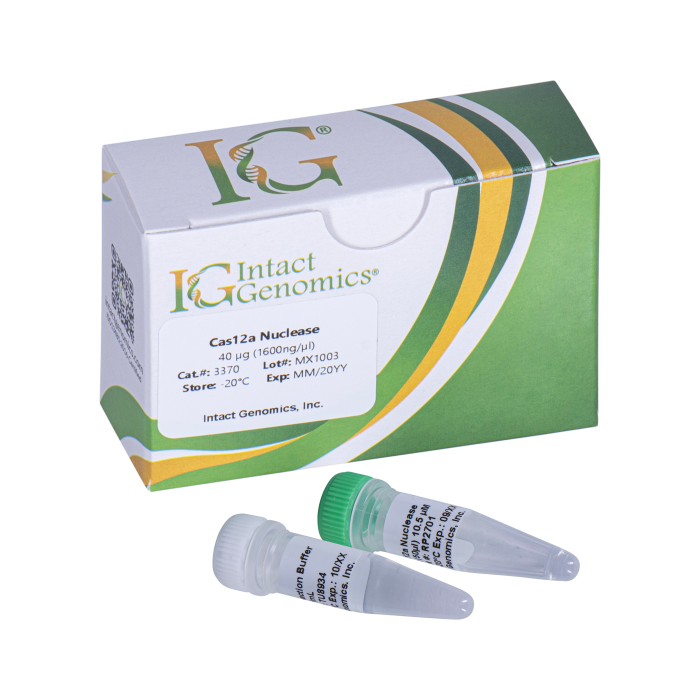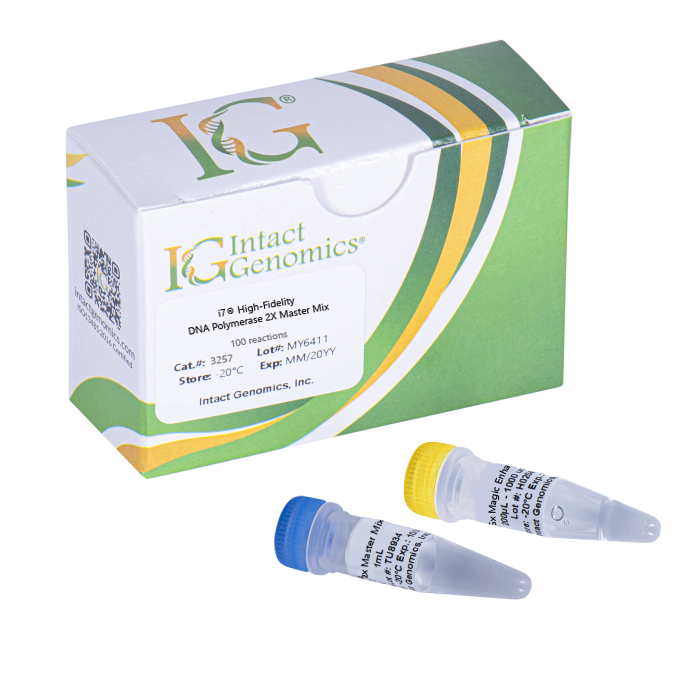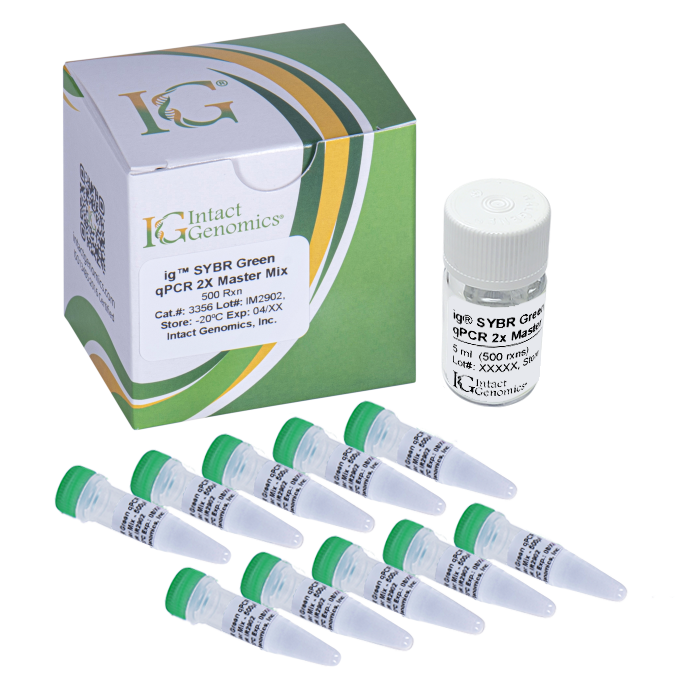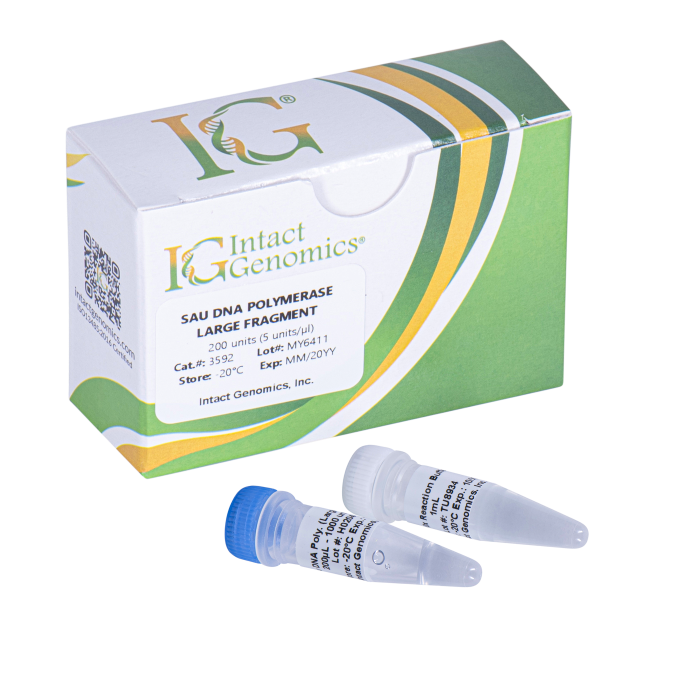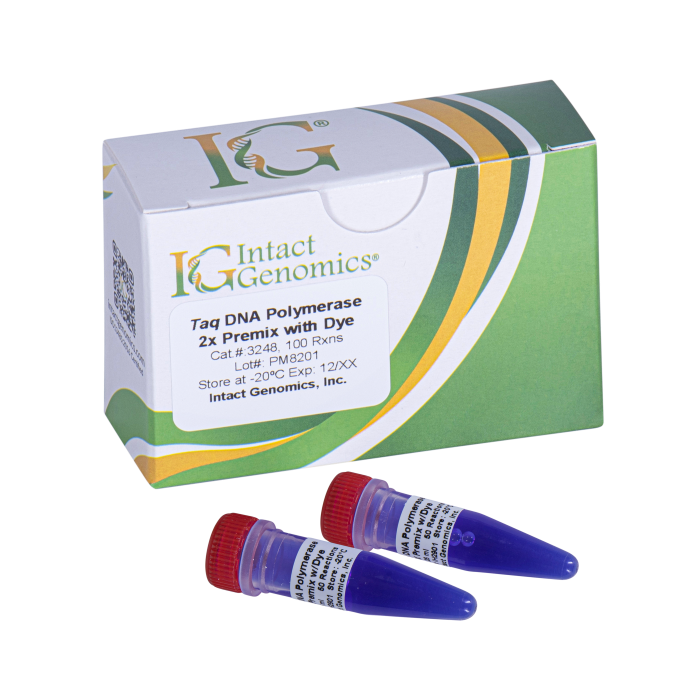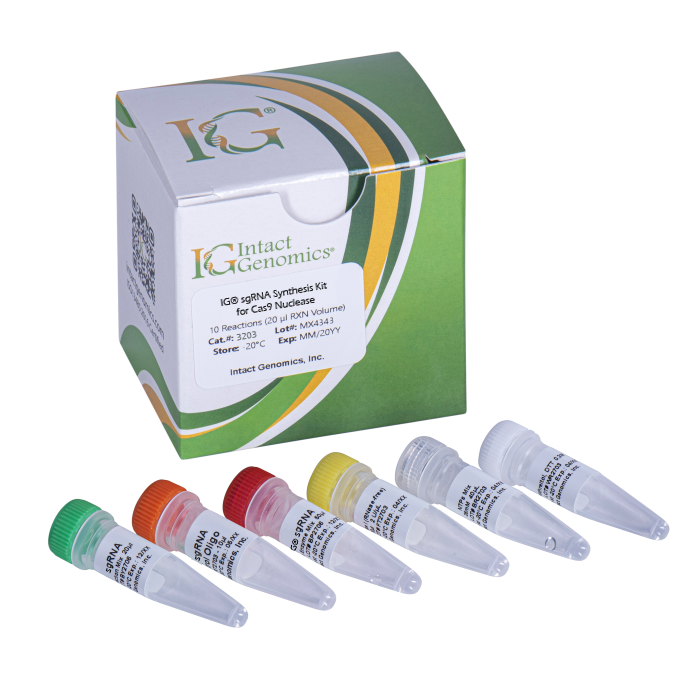IG® Recombinase Polymerase Amplification (RPA) Kit provides a mixture of the necessary enzymes to simplify and quicken the setup for your RPA reaction.
ig® Recombinase Polymerase Amplification (RPA) Kit v1
Price range: $230.00 through $1,670.00
Description
The ig® RPA Kit version 1 from Intact Genomics gives the user a faster, more streamlined Recombinase Polymerase Amplification experience by providing the necessary reagents and enzymes to amplify user-provided DNA template. Isothermal RPA is an enhancement over PCR amplification because it does not require thermocycling and provides better sensitivity.
Recombinase Polymerase Amplification (RPA) is a molecular biology technique that amplifies DNA at a constant temperature (37-42°C) using a recombinase (e.g. UvsX), primers, a single-stranded DNA binding protein (SSB), and a strand displacing DNA polymerase. T4 UvsX is used in combination with its accessory protein, UvsY. The recombinase interacts with the primers to form nucleoprotein filament. This complex can bind with homologous double-stranded DNA through a strand exchange. After the exchange, a single-stranded binding protein, T4 gp32, stabilizes the displaced strand. Finally, Bsu/Sau DNA polymerase extends the DNA from the primers and creates a new complete copy of the template. Amplification can continue as in Polymerase Chain Reaction (PCR).
Components and Storage
- Enzyme Mixture
- 2x RPA Reaction Master Mix
- 280 mM Magnesium Acetate (MgOAc)
- RPA Positive Control
Storage Temperature
-20°C
Schematic of Recombinase Polymerase Amplification
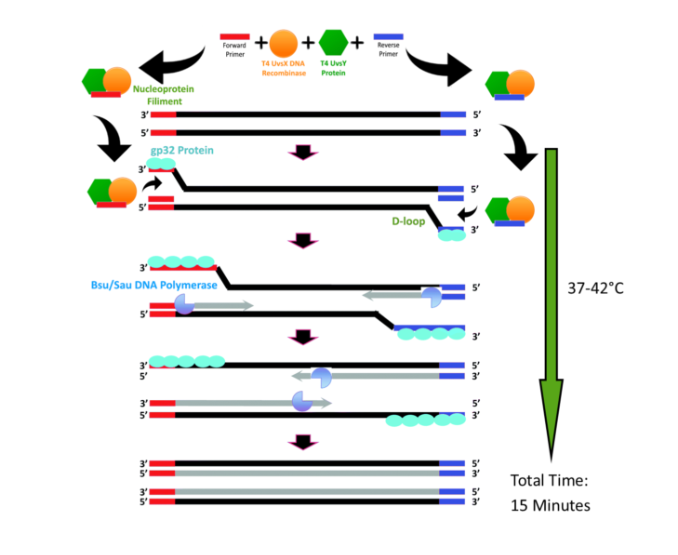
Application and Benefits
- Highly selective and sensitive isothermal amplification technique.
- Alternative to PCR. No Thermocycler needed.
- Speed and sensitivity. Excellent for Rapid Molecular and Agricultural tests.
- No DNA pretreatment required.
- Compatible with a variety of endpoint detection methods, (e.g. lateral flow, real-time fluorescence)
- All enzymes thoroughly tested for activity and purity.
Quality Control
All component proteins of the Enzyme Mixture are free from detectable nuclease activities.
References
- Cromie GA, Connelly JC, Leach DR (2001) Recombination at double-strand breaks and DNA ends: conserved mechanisms from phage to humans. Mol Cell 8: 1163–1174
- Michel B, Grompone G, Flores MJ, Bidnenko V (2004) Multiple pathways process stalled replication forks. Proc Natl Acad Sci U S A 101: 12783–12788
- Liu J, Ehmsen KT, Heyer WD, Morrical SW (2011) Presynaptic filament dynamics in homologous recombination and DNA repair. Crit Rev Biochem Mol Biol 46: 240–270
Related Products
- T4 UvsX Recombinase (Cat.# 3562)
- T4 gp32 Protein (Cat.# 3515)
- T4 UvsY Protein (Cat.# 3572)
- Bsu DNA Polymerase (Cat.# 3585)
- Sau DNA Polymerase (Cat.# 3595)
- Exonuclease III (Cat.# 3415)
- Exonuclease IV (Nfo) (Cat.# 3425)
Technical Support
Intact Genomics is committed to supporting the worldwide scientific research community by supplying the highest quality reagents. Each new lot of our products is tested to ensure it meets the quality standards and specifications designated for the product.
Please follow the instructions carefully and contact us if additional assistance is needed. We appreciate your business and your feedback regarding the performance of our products in your applications.
3525 3530
Additional information
| Reactions | 25 Reactions, 100 Reactions, 500 Reactions |
|---|
Without Positive Control
-
- Due to the viscosity of the 2X RPA Reaction Master Mix, it is recommended to, first, mix the DNA
template, primers, and enzyme mixture on ice. Then, add the 2x RPA Reaction Master Mix.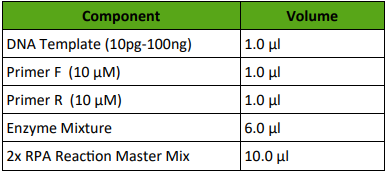
- To initiate the reaction, add 1 µl of MgOAc, mix thoroughly, and pulse spin the reaction tube.
- Incubate the tube at 38°C for 15-60 minutes. The reaction may also be performed at ambient temperature. However, we recommend increasing the incubation time to a minimum of 30 minutes.
- Purify the DNA via ethanol precipitation (or the user’s preferred method). Analyze the DNA by gel electrophoresis on a 1% agarose gel (or up to 2% agarose gel).
With Positive Control
- Mix Positive Control with enzyme mixture thoroughly then add 2x RPA Reaction mix.

- To initiate the reaction, add 1 µl of MgOAc, mix thoroughly, and pulse spin the reaction tube.
- Incubate the tube at 38°C for 15-60 minutes. The reaction may also be performed at ambient temperature. However, we recommend increasing the incubation time to a minimum of 30 minutes.
- Purify the DNA via ethanol precipitation (or the user’s preferred method). Analyze the DNA by gel electrophoresis on a 1% agarose gel (or up to 2% agarose gel).
- Due to the viscosity of the 2X RPA Reaction Master Mix, it is recommended to, first, mix the DNA

